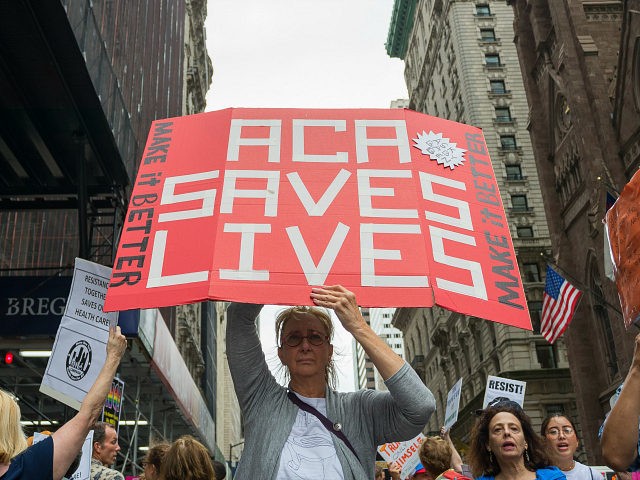A new analysis by the Illinois Department of Insurance shows that residents in the state who have insurance through the Obamacare exchange will see rate increases ranging from 16 to 37 percent next year for the lowest-cost plans.
“The Illinois Department of Insurance submitted rates to the federal government Wednesday that would increase the average cost of the lowest-priced silver plans by 35 percent statewide,” the Chicago Tribune reported. “The lowest-priced bronze-level plans would increase, on average, by 20 percent, and the lowest-priced gold plans would increase by 16 percent, according to a department analysis obtained by the Tribune.”
The Tribune reported, as an example, a 21-year-old non-smoker living in Cook County could pay $315 a month for the lowest-priced silver plan in Cook County next year, compared to $221 a month this year, according to the analysis.
A 21-year-old non-smoker living in DuPage and Kane counties could pay $338 a month next year for the lowest-priced silver plan, compared to a $266 monthly fee this year, the Tribune reported.
The state’s projections came after the release last month of proposed rate increases from insurers, which showed large average jumps over plan costs last year.
“Rates will not be finalized until October, shortly before consumers may start choosing plans during open enrollment, which starts Nov. 1,” the Tribune reported.
The state’s report also predicts Illinois consumers will see less competition among insurance providers on the exchange, according to the analysis.
Consumers will only have one insurer that will provide individual plans in 13 counties in the state next year, which is nearly double the number of Illinois counties that have only one insurer on the exchange this year.
“The Department of Insurance reviewed the rates, but generally cannot reject or change proposed rates, though it does have the power to try to negotiate them lower,” the Tribune reported.
Jennifer Hammer, director of the Department of Insurance, blamed “major structural flaws” in Obamacare for the continued increase in insurance costs.
“There is no question that major structural flaws in the (Affordable Care Act, or Obamacare) have forced higher insurance rates and separated families from trusted physicians and hospitals,” Hammer said.
“Years before the Trump administration came to office, Obamacare’s double-digit rate increases and onerous mandates have been squeezing the pocket books of the American people,” a spokesperson for the Department of Health and Human Services said in a statement on Thursday.
Others blame “uncertainty” and “choas” about the future of Obamacare as the Senate tries again this week to begin to dismantle it through the Graham-Cassidy legislation.
“It’s just more indication of what we’ve seen already, which is (that) the incredible uncertainty that is being injected into the health care system by the Trump administration is causing chaos,” senior policy specialist at the Sargent Shriver National Center on Poverty Law, Stephani Becker, told the Tribune.
The Tribune, which obtained a copy of the analysis, reported that the vast majority of consumers in Illinois get health insurance through their employer or government programs such as Medicare and Medicaid.
“But this year, more than 350,000 Illinois residents enrolled in exchange plans,” the Tribune reported. “Consumers can also buy individual plans outside the exchange but they can’t receive tax credits if they go that route.”
Elliot Richardson, CEO of the Small Business Advocacy Council, said on Wednesday that less competition among insurers is bad news for small businesses in the Chicago area.
“It’s very difficult to find affordable health insurance, so we need more competition overall, not less,” Richardson said. “When small business owners have trouble obtaining affordable, quality health insurance because of a lack of competition, it does impact the growth of that business, it impacts the operations of that business and it can impact whether a small business wants to bring on new employees.”

COMMENTS
Please let us know if you're having issues with commenting.